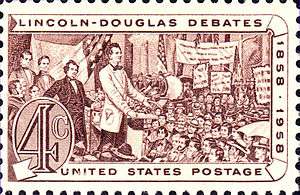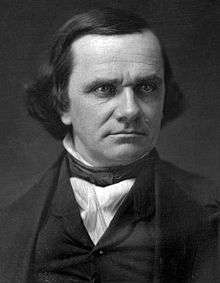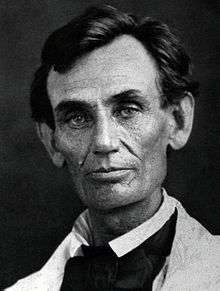1858 and 1859 United States Senate elections
The United States Senate elections of 1858 and 1859 were elections which had the Republican Party gain five additional seats in the United States Senate, but the Democrats retained their majority. That majority would erode in 1860 with the secession of the southern states leading up to the Civil War. In Illinois, incumbent Stephen A. Douglas (D) and challenger Abraham Lincoln (R) held a series of seven debates, known as the "Lincoln–Douglas debates."
| |||||||||||||||||||||||||||||||||||||||||||||||||||||
22 of the 66 seats in the United States Senate (with special elections) 34 seats needed for a majority | |||||||||||||||||||||||||||||||||||||||||||||||||||||
|---|---|---|---|---|---|---|---|---|---|---|---|---|---|---|---|---|---|---|---|---|---|---|---|---|---|---|---|---|---|---|---|---|---|---|---|---|---|---|---|---|---|---|---|---|---|---|---|---|---|---|---|---|---|
| |||||||||||||||||||||||||||||||||||||||||||||||||||||
| |||||||||||||||||||||||||||||||||||||||||||||||||||||

As this election was prior to ratification of the seventeenth amendment, Senators were chosen by state legislatures.
Results summary
Senate Party Division, 36th Congress (1859-1861)
- Majority Party: Democratic (38–25)
- Minority Party: Republican (25–26)
- Other Parties: American (2)
- Total Seats: 66–68
Change in Senate composition
Before the elections
| D3 | D2 | D1 | |||||||
| D4 | D5 | D6 | D7 | D8 | D9 | D10 | D11 | D12 | D13 |
| D23 | D22 | D21 | D20 | D19 | D18 | D17 | D16 | D15 | D14 |
| D24 | D25 | D26 Ran |
D27 Ran |
D28 Ran |
D29 Ran |
D30 Ran |
D31 Ran |
D32 Ran |
D33 Ran |
|---|---|---|---|---|---|---|---|---|---|
| Majority → | D34 Ran | ||||||||
| KN4 Unknown |
D42 Retired |
D41 Retired |
D40 Retired |
D39 Retired |
D38 Retired |
D37 Ran |
D36 Ran |
D35 Ran | |
| KN3 Unknown |
KN2 | KN1 | R20 Ran |
R19 Ran |
R18 Ran |
R17 | R16 | R15 | R14 |
| R4 | R5 | R6 | R7 | R8 | R9 | R10 | R11 | R12 | R13 |
| R3 | R2 | R1 | |||||||
As a result of the elections
| D3 | D2 | D1 | |||||||
| D4 | D5 | D6 | D7 | D8 | D9 | D10 | D11 | D12 | D13 |
| D23 | D22 | D21 | D20 | D19 | D18 | D17 | D16 | D15 | D14 |
| D24 | D25 | D26 Re-elected |
D27 Re-elected |
D28 Re-elected |
D29 Re-elected |
D30 Re-elected |
D31 Re-elected |
D32 Re-elected |
D33 Hold |
|---|---|---|---|---|---|---|---|---|---|
| Majority → | D34 Hold | ||||||||
| R24 Gain |
R25 Gain |
KN1 | KN2 | V1 D Loss |
D38 Gain |
D37 Gain |
D36 Hold |
D35 Hold | |
| R23 Gain |
R22 Gain |
R21 Gain |
R20 Re-elected |
R19 Re-elected |
R18 Re-elected |
R17 | R16 | R15 | R14 |
| R4 | R5 | R6 | R7 | R8 | R9 | R10 | R11 | R12 | R13 |
| R3 | R2 | R1 | |||||||
| Key: |
|
Race summaries
Special elections during the 35th Congress
In these elections, the winners were seated during 1858 or in 1859 before March 4; ordered by election date.
| State | Incumbent | Results | Candidates | ||
|---|---|---|---|---|---|
| Senator | Party | Electoral history | |||
| Minnesota (Class 1) |
New state | Minnesota's first senators were elected May 11, 1858. Democratic gain. |
[data unknown/missing] | ||
| Minnesota (Class 2) |
New state | Minnesota's first senators were elected May 11, 1858. Democratic gain. |
| ||
| Oregon (Class 2) |
New state | Oregon's first senators were elected in 1858 in advance of statehood.[1] Democratic gain. |
| ||
| Oregon (Class 3) |
New state | Oregon's first senators were elected in 1858 in advance of statehood.[1] Democratic gain. |
| ||
| North Carolina (Class 3) |
Thomas Clingman | Democratic | 1858 (Appointed) | Interim appointee elected November 23, 1858 to finish the term.[2][3] |
|
| South Carolina (Class 2) |
Arthur P. Hayne | Democratic | 1858 (Appointed) | Interim appointee retired when successor elected. Winner elected December 3, 1858. Democratic hold. Winner was also elected to the next term, see below. |
|
Races leading to the 36th Congress
In these regular elections, the winners were elected for the term beginning March 4, 1859; ordered by state.
All of the elections involved the Class 2 seats.
| State | Incumbent | Results | Candidates | ||
|---|---|---|---|---|---|
| Senator | Party | Electoral history | |||
| Alabama | Clement Claiborne Clay | Democratic | 1853 (Special) | Incumbent re-elected in 1858. |
|
| Arkansas | William K. Sebastian | Democratic | 1848 (Appointed) 1848 (Special) 1853 |
Incumbent re-elected in 1859. |
|
| Delaware | Martin W. Bates | Democratic | 1857 (Special) | Incumbent lost re-election. New senator elected in 1858. Democratic hold. |
|
| Georgia | Robert Toombs | Democratic | 1852 | Incumbent re-elected in 1858. |
|
| Illinois | Stephen A. Douglas | Democratic | 1846 1852 |
Incumbent re-elected January 5, 1859. |
|
| Iowa | George Wallace Jones | Democratic | 1848 1852 |
Incumbent lost renomination. New senator elected January 26, 1858.[5] Republican gain. |
|
| Kentucky | John B. Thompson | Know Nothing | 1852 or 1853 | Unknown if incumbent retired or lost re-election. New senator elected in January 1858. Democratic gain. |
|
| Louisiana | Judah P. Benjamin | Democratic | 1852 | Incumbent re-elected in 1859. |
|
| Maine | William P. Fessenden | Republican | 1854 (Special) | Incumbent re-elected in 1859. |
|
| Massachusetts | Henry Wilson | Republican | 1855 (Special) | Incumbent re-elected in 1859. |
|
| Michigan | Charles E. Stuart | Democratic | 1853 | Incumbent retired. New senator elected in 1858. Republican gain. |
|
| Minnesota | James Shields | Democratic | 1849 (Illinois) 1849 (Illinois: Election voided) 1849 (Illinois: Special) 1855 (Illinois: Lost) 1858 (Minnesota) |
Incumbent lost re-election. New senator elected December 15, 1859.[6] Republican gain. |
|
| Mississippi | Albert G. Brown | Democratic | 1854 (Special) | Incumbent re-elected in 1859. |
|
| New Hampshire | John P. Hale | Republican | 1846 1853 (Retired) 1855 |
Incumbent re-elected in 1859. |
|
| New Jersey | William Wright | Democratic | 1852 or 1853 | Incumbent lost re-election. New senator elected in 1858. Republican gain. |
|
| North Carolina | David Reid | Democratic | 1854 | Incumbent lost re-election. New senator elected in 1858 or 1859. Democratic hold. |
|
| Oregon | Delazon Smith | Democratic | 1859 | Incumbent lost re-election. Legislature failed to elect. Democratic loss. Seat would remain vacant until 1860. |
Delazon Smith (Democratic) [data unknown/missing] |
| Rhode Island | Philip Allen | Democratic | 1853 | Incumbent retired. New senator elected in 1858. Republican gain. |
|
| South Carolina | Arthur P. Hayne | Democratic | 1858 (Appointed) | Interim appointee retired. New senator elected December 3, 1858. Democratic hold. Winner was also elected to finish the current term, see above. |
|
| Tennessee | John Bell | Know Nothing | 1847 1853 |
Unknown if incumbent retired or lost re-election. New senator elected in 1858. Democratic gain. |
|
| Texas | Sam Houston | Democratic | 1846 1847 1853 |
Incumbent retired. New senator elected in 1859. Democratic hold. |
|
| Virginia | Robert M. T. Hunter | Democratic | 1846 1852 |
Incumbent re-elected in 1858. |
|
Race leading to the 37th Congress
In this regular election, the winner was elected for the term beginning March 4, 1861.
This election involved a Class 3 seat.
| State | Incumbent | Results | Candidates | ||
|---|---|---|---|---|---|
| Senator | Party | Electoral history | |||
| Kentucky (Class 3) |
John J. Crittenden | Know Nothing | 1817 1819 (Resigned) 1835 1841 (Retired) 1842 (Appointed) 1842 or 1843 (Special) 1843 1848 (Resigned) 1853 |
Incumbent retired. Winner elected December 12, 1859, far in advance of the term. Winner wasn't seated until term began March 4, 1861. Democratic gain. |
[data unknown/missing] |
Elections during the 36th Congress
In this election, the winner was elected in 1859 on or after March 4; ordered by date.
| State | Incumbent | Results | Candidates | ||
|---|---|---|---|---|---|
| Senator | Party | Electoral history | |||
| Texas (Class 1) |
Matthias Ward | Democratic | 1858 (Appointed) | Interim appointee lost nomination to finish the term. Winner was elected December 5, 1859. Democratic hold. |
[data unknown/missing] |
Illinois
| ||||||||||||||||||||
| ||||||||||||||||||||
The October surprise of the election was the endorsement of the Democrat Douglas by former Whig John J. Crittenden. Non-Republican former Whigs comprised the biggest block of swing voters, and Crittenden's endorsement of Douglas rather than Lincoln, also a former Whig, reduced Lincoln's chances of winning.[8]
On election day, as the districts were drawn to favor Douglas' party, the Democrats won 40 seats in the state house of Representatives, and the Republicans won 35. In the state senate, Republicans held 11 seats, and Democrats held 14. Stephen A. Douglas was reelected by the legislature, 54–46, even though Lincoln's Republicans won the popular vote with a percentage of 50.6%, or by 3,402 votes.[9] However, the widespread media coverage of the debates greatly raised Lincoln's national profile, making him a viable candidate for nomination as the Republican candidate in the upcoming 1860 presidential election. He would go on to secure both the nomination and the presidency, beating Douglas (as the Northern Democratic candidate), among others, in the process.
Lincoln also went on to be in contact with editors looking to publish the debate texts. George Parsons, the Ohio Republican committee chairman, got Lincoln in touch with Ohio's main political publisher, Follett and Foster, of Columbus. They published copies of the text, and titled the book, Political Debates Between Hon. Abraham Lincoln and Hon. Stephen A. Douglas in the Celebrated Campaign of 1858, in Illinois. Four printings were made, and the fourth sold 16,000 copies.[10]
See also
References
- "Two New Senators". timesmachine.nytimes.com.
- Byrd, Robert C.; Wolff, Wendy (October 1, 1993). "The Senate, 1789-1989: Historical Statistics, 1789-1992" (volume 4 Bicentennial ed.). U.S. Government Printing Office., page 150
- "Hon. Thomas L. Clingman--The new Senator from North Carolina". timesmachine.nytimes.com.
- Journal of the House of Representatives of the General Assembly of the State of Illinois, 1859. Springfield, IL: Bailache & Baker, Printers. 1859.
- Clark, Dan Elbert. History of Senatorial Elections in Iowa: A Study in American Politics. p. 119.
- "From Minnesota.; ELECTION OF A UNITED STAES SENATOR--THREATENED IMPEACHMENT OF THE LIEUTENANT-GOVERNOR". timesmachine.nytimes.com.
- "IL US Senate 1858". OurCampaigns.com. OurCampaigns. Retrieved 28 November 2018.
- Guelzo, Allen C. (2008). Lincoln and Douglas: The Debates That Defined America. Pages 273–277, 282.
- Guelzo, Allen C. (2008). Lincoln and Douglas: The Debates that Defined America. New York, NY: Simon and Schuster. pp. 284–285.
- Guelzo, Allen C. (2008). Lincoln and Douglas: The Debates that Defined America. New York, NY: Simon and Schuster. pp. 305–306.
- Party Division in the Senate, 1789-Present, via Senate.gov

